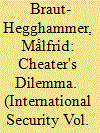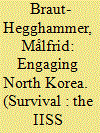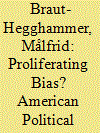| Srl | Item |
| 1 |
ID:
192020


|
|
|
|
|
| Summary/Abstract |
What are the causes of cross-national variation in nuclear hawkishness? In the third nuclear age such variation is likely to be more consequential than in the past. While such variation has been observed, it has not been explained. This article probes possible causes of such variation drawing on a new wave of research on nuclear inhibitions. Specifically, I explore how the threat environment, domestic-level factors, and elite maneuvering, can affect nuclear hawkishness. I argue that hawkishness is less likely to be an outlier phenomenon among the more recent nuclear weapons states and in the broader universe of cases.
|
|
|
|
|
|
|
|
|
|
|
|
|
|
|
|
| 2 |
ID:
174121


|
|
|
|
|
| Summary/Abstract |
Between the 1991 Gulf War and the U.S.-led invasion in 2003, the Iraqi regime faced a cheater's dilemma: how much should it reveal of Iraq's weapons of mass destruction (WMD) capabilities when each additional revelation made it less likely that the country would be rewarded, while continued denial also prevented the lifting of sanctions. The Iraqi leadership struggled to resolve this dilemma, as elites pursued competing policies and subordinates did not consistently obey Saddam Hussein's orders. These difficulties reflected principal-agent problems that were aggravated by the leadership's initial attempts to deny and cover up Iraq's WMD capabilities. Together, the cheater's dilemma and principal-agent problems explain a range of puzzling Iraqi behaviors that came across as calculated ambiguity to the outside world. These findings offer insights into the incentives and constraints that shape how other authoritarian regimes respond to external pressures to eliminate their WMD, and the extent to which they are willing and able to disclose information about past programs and their past efforts to conceal this information from the outside world.
|
|
|
|
|
|
|
|
|
|
|
|
|
|
|
|
| 3 |
ID:
181691


|
|
|
|
|
| Summary/Abstract |
North Korea and the United States are edging towards re-engagement. They agree in principle on pursuing a phased approach to negotiations but disagree on how to begin and what the end goal should be. A warming-up phase can allow states to informally explore specific options for future engagement. By participating in activities such as table-top exercises, simulations and familiarisation visits, the participants develop a more specific understanding of the purpose and format of the activities and verification measures that might follow a formal agreement. This process engages the technical and military bureaucracies at an early stage. It provides a private setting to raise concerns and address misunderstandings. It is an opportunity to demonstrate goodwill and interest in engagement that does not require concessions. Drawing on past examples, this article suggests specific options for a warming-up phase involving North Korea and the United States.
|
|
|
|
|
|
|
|
|
|
|
|
|
|
|
|
| 4 |
ID:
081978


|
|
|
|
|
| Publication |
2008.
|
| Summary/Abstract |
This article examines Libya's nuclear rollback in light of sources that have emerged since December 2003. These sources offer new perspectives on the Libyan regime's motives for pursuing nuclear weapons, why it concluded that the effort to acquire nuclear weapons was becoming a threat to national security, and how this reflects on Libya's security policy under Mu'ammar al-Qadhafi. It will be argued that this particular case illustrates a recent trend towards post-revolutionary realpolitik in Libyan foreign and security policy
|
|
|
|
|
|
|
|
|
|
|
|
|
|
|
|
| 5 |
ID:
167669


|
|
|
|
|
| Summary/Abstract |
This article examines whether there is a US bias affecting how American political scientist study nuclear weapons and their effects. US dominance in the production and dissemination of political science literature on nuclear weapons is reflected in concepts and theories of their spread and use, as well as prominent datasets on nuclear proliferation. More broadly, is there a US bias in scholarship on nuclear weapons produced by American political scientist? In this article I examine whether there is a US bias that affects what is studied, what kinds of questions are asked and what cases are examined, and how the evidence is interpreted.
|
|
|
|
|
|
|
|
|
|
|
|
|
|
|
|